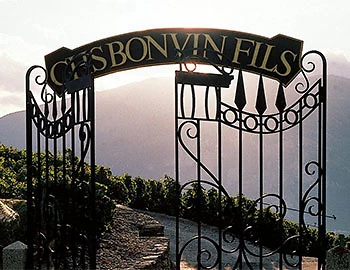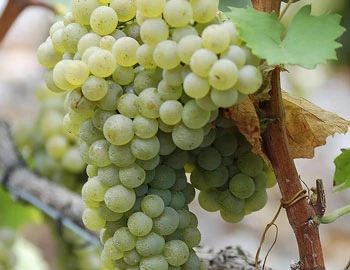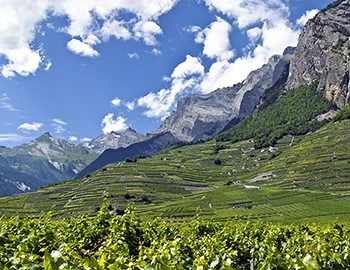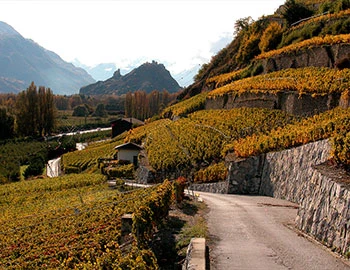Petite Arvine Tradition 2020
AOC Wallis, Bonvin, 1500 ml

| Grape variety: | Petite Arvine |
| Producer: | Bonvin |
| Origin: | Switzerland / Wallis |
| Other vintages: |
Description
A very impressive Valais ambassador: compact, full-bodied and powerful. The complexity of aromas ranges from pink grapefruit, rhubarb and apricot via lemon balm, ginger and oregano, to captivating flower scents. Its flavour is equally complex and long-lasting. The typical Petite Arvine salinity runs through to the finish with a fine, quite pleasant bitter note.
Our head sommelier Marc Almert about the Petite Arvine Tradition
I've now been living in Switzerland for five years. And the thing that my international fellow sommeliers envy me for most of all is the sheer range of indigenous grape varieties found here, varieties that they only really ever get to taste when they come to Switzerland. I can imagine no lovelier a place to taste the Petite Arvine from the Bonvin winery than the little wine cottage, La Guérite Brulefer, which is situated in the middle of a steep vineyard overlooking the Rhône. And to go with it, a little plate of Swiss delicacies to make it a perfect day... and yet, the "Tradition", with its interplay of peppery spices, herbaceous notes and invigorating freshness, specially pressed for us at Baur au Lac Vins, isn't just a winner in the Valais canton, but elsewhere too. Santé!
Attributes
| Origin: | Switzerland / Wallis |
| Grape variety: | Petite Arvine |
| Label: | Vegan |
| Ripening potential: | 1 to 5 years after harvest |
| Drinking temperature: | 10 to 12 °C |
| Food Pairing: | Grilled fish, Cheese board, Oysters, Coquilles Saint Jacques on lentils |
| Vinification: | fermentation in steel tank, pressed carefully and immediately, fermentation at low temperatures |
| Harvest: | hand-picking, strict selection |
| Maturation: | in steel tank, on the yeast, bâtonnage |
| Volume: | 13.5 % |
| Note: | Contains sulphites |
Bonvin
High above Sion, on the Clos du Château, is the heart of the oldest wine trading house in Valais – today's winery Charles Bonvin SA. The view sweeps over the wide Rhone valley, meets the two castle hills of Tourbillon and Valère and grazes on the magnificent Valais vine landscape with its countless terraces.
In the mid-19th century, Valais was a poor area. The valley was largely marshland. The people, mostly farmers, mainly subsisted from agriculture and the dairy industry. The wineries were set up where nothing else could be grown. The vineyard was smaller than the one in Zurich and the yield was mostly for self-consumption. The Valais wine couldn't leave its borders, although it had been cultivated since Roman times.

Petite Arvine
A grain of salt
The white Petite Arvine is the diva of Swiss grapes. It thrives only in the very best sites of Valais: sunny and sheltered from wind, not too dry, but not too moist. No wonder they were almost extinct. For convenience, vintners replaced the delicate plants from the beginning of the last century with more low-maintenance varieties. Their rebirth in the 1990s is thanks to dedicated companies that recognized the unique profile of this primordial Valais variety. Their hallmarks are aromas of grapefruit and rhubarb, paired with a tangy acidity and a curious, slightly salty touch at the end – like a grain of fleur de sel on the tongue. The Petite Arvine is mostly made into a dry wine, but as a sweet wine it offers a fantastic, sweet-spicy taste experience.

Wallis
Valais: Alpine wines with class
More than 20 varieties of grapes can yield wines in Valais that are full of character. A large number of them grow on spectacular, steep slopes. Sealed off by mighty chains of mountains, old plantings like Petite Arvine, Amigne and Cornalin have survived in Valais, and today they are highly sought-after by wine enthusiasts. The highest vineyards in Europe are also found in Valais: the Savignin vines (known here as “Heida”), rooted in the mountain community of Visperterminen.

Switzerland
Switzerland – A small country with enormous diversity
Switzerland is famous for its banks, watches, and cheese, but not necessarily for its wine. The Swiss didn't invent wine, but they have been extremely open and curious to it. Wine culture arrived in what is now modern Switzerland via several routes: from Marseilles to Lake Geneva and the Lower Valais region; from the Aosta Valley through the Great St. Bernard Pass to the rest of Valais; from the Rhone through Burgundy, across the Jura Mountains to Lake Constance; and from Lombardy to Ticino, and then on to Grisons.







